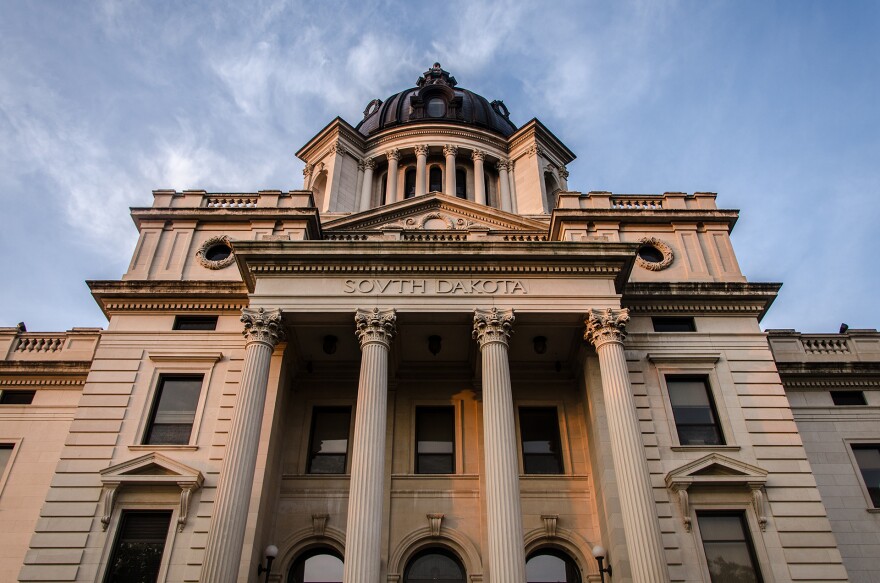Gov. Kristi Noem is signing the largest sales tax cut in state history.
But, with the stroke of her pen, she and state lawmakers deliver the deathblow to a seven-year-old political titan—the Partridge Amendment that laid the groundwork for the cut.
There’s no shortage of ire aimed at this piece of legislation.
“Occasionally you read an obituary with happiness. That’s how I feel about the Partridge Amendment," said Rep. Tony Venhuizen, R-Sioux Falls.
He made a move to strike the Partridge Amendment from state law.
Even the amendment’s namesake—former Republican State Sen. Jeff Partridge—is glad to see it gone.

“It was a means by which to share with, really, a conservative Republican group that ‘Hey, if we can raise taxes and make it up somewhere else, let’s give it back to the people,'" he said.
The Partridge Amendment was a product of its time. The year was 2016. The cause: to increase the overall state sales tax by half a penny to boost teacher pay. That’s when South Dakota’s teacher salaries were the lowest in the nation.
The state was also in the midst of a case before the U.S. Supreme Court with online retailer Wayfair, over whether states had the right to collect taxes from online sales.
The Partridge Amendment said if the state won the case—for every $20 million raised in online sales tax collections, the state would reduce the overall sales tax rate by .1 percent.
“And so, therefore, wouldn’t it make sense for us to look at something—when we’re potentially raising taxes—that you would look to roll it back?” Partridge said.
The Partridge Amendment worked. It secured the necessary number of votes needed to ultimately increase teacher pay.
Once it took effect, however, the law was described as ambiguous and unenforceable.
Some describe the Partridge Amendment as a promise. Like Rep. Chris Karr, R-Sioux Falls.
Since the 2018 Wayfair decision, Karr has pushed to change the law in a way that would allow for sales tax reductions.

“Finally, I said we don’t even need this Partridge Amendment to give us permission to do something," Karr said. "We are legislators. We can do math. We see in black and white. We can reduce this. So, let’s reduce it.”
And this year, state lawmakers did just that by passing an overall sales tax reduction from 4.5 percent down to 4.2 percent. That will cut around $104 million in revenues for the state.
Others say despite having never been triggered, the Partridge Amendment served its purpose by keeping the conversation about rolling back the tax alive.
“From the time when it was passed there was a recognition there were a lot of flaws in there," said Nathan Sanderson, the executive director of the South Dakota Retailers Association.
When the Partridge Amendment passed, Sanderson was the Director of Policy and Operations for then-Gov. Dennis Daugaard.
“A lot of the expectations that folks had about what would happen weren’t able to come to fruition just because of the way it was drafted," Sanderson said.
That’s because it called for a reduction of the state sales tax every time $20 million in online sales tax collections came in.
"Basically, if you codify that you know that’s going to get antiquated relatively quickly," Sanderson said. "Because you know that overtime the value of .1 percent of the sales tax is going to naturally increase."
Meaning that the state would take a revenue hit every time the Partridge Amendment is triggered. At the time—in 2016—the value of .1 percent of the state sales tax collections was about $20 million. Now, it’s around $35 million.
The other issue with the Partridge Amendment was how to track online sales. Those retail transactions have changed a lot since 2016.
That’s exactly why State Sen. Jean Hunhoff, R-Yankton, did not support the Partridge Amendment.
“I think everybody thought that it was just simple—as the dollars flow in, this is what comes online. It wasn’t that simple," Hunhoff said. "The other point is in the process. Revenue was telling us in order to keep track and work that way we’re going to need extra people because they’re going to have to go out and audit firms and make sure that they’re doing all this.”
Hunhoff said the Partridge Amendment did not serve its intended purpose. However, she said lawmakers have delivered something much easier to understand—a .3 percent sales tax reduction that goes away in four years.
After that, she said lawmakers can reevaluate the cut.
“If the economy is going good, whose ever in the legislature at that time can make the decision to remove the sunset," Hunhoff said.
That’s a conversation lawmakers will have in the future. It’s one that Jeff Partridge looks forward to.
“The tax, really—in my mind—was always a temporary—if there was a way to make it temporary, that’s what we wanted to do," Partridge said. "I think the Partridge Amendment helped really provide for some conversation around that.”
Partridge said he hopes lawmakers can cut the remaining .2 percent of the tax, which would bring the overall state sales tax down to its pre-2016 level.
But that all depends on how strong revenue collections are in the future and where South Dakota's teacher pay ranks nationally.


